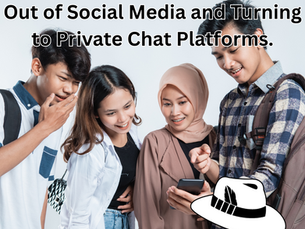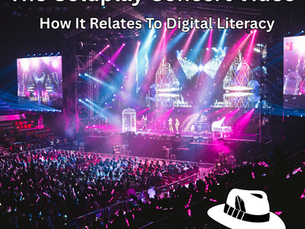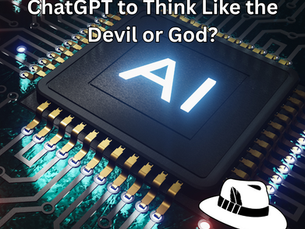top of page


Big Tech, Parents, Caregivers, Legislation, & Real-World Harm, Would We Accept This in Any Other Industry?
Big Tech platforms often ignore online child exploitation while facing little accountability, something no other industry would get away with. This article urges parents, lawmakers, and companies to step up, share responsibility, and push for real legislative action that prioritizes youth safety online but also protects everyones privacy

The White Hatter
Aug 76 min read


Teens Back Then vs. Teens Today: What’s Different, What’s The Same, and What The Data Shows.
A data-driven comparison of today’s teens and those from the 1970s–1990s challenges nostalgia. While modern youth face mental health concerns, they’re less likely to drop out, get pregnant, use drugs, or die in car crashes. Today’s risks are different, not worse. Facts over fear.

The White Hatter
Aug 67 min read


Why Dismissing Parental Responsibility Helps No One: Our Message To Today’s Parents and Caregivers
When online harm happens, people often ask, “Where were the parents?” Some now claim parents can’t compete with tech, but that message can lead to helplessness. This article argues that parental connection, not control, is the real key to keeping youth safer online, and the research backs it up.

The White Hatter
Aug 53 min read


Book Review - Tech Smart Parenting: How to Keep Your Kids Happy & Safe Online"
Tech Smart Parenting” by Catherine Knibbs is the best book we’ve read in a long time on youth, digital literacy, and online safety. Backed by research and real-world experience, it offers clear, practical guidance and a refreshingly balanced approach for any parent or caregiver raising kids in a digital world.

The White Hatter
Aug 13 min read


Why Youth & Teens Need Parents and Caregivers More Than Ever - Artificial Intelligence, Friction, Family, & Relationships
AI is changing how youth learn, connect, and grow, but with few rules and little oversight. This article urges parents, caregivers, and educators to step in. It highlights the risks of unregulated AI, the loss of healthy friction, and the need for thoughtful guidance and stronger regulation.

The White Hatter
Jul 309 min read


Research Over Rhetoric: Look Beyond the Fear in Tech and Teen Discourse
The “Delay is the Way” movement says holding off on tech is the safest path for kids, but this article challenges that view. Instead of fear-based slogans, it calls for evidence-based parenting, digital literacy, and corporate accountability to prepare youth for real-world tech use.

The White Hatter
Jul 305 min read


Are We Listening to the Right Voices? Rethinking the Narrative Around Youth and Tech
Many teens are thriving online, but adult fears often dominate the conversation. Rather than banning or delaying tech, we should guide youth with support, education, and trust. When we involve teens in decisions and model responsible use ourselves, they become more capable digital citizens.

The White Hatter
Jul 294 min read


How Socio-Economic Access Can Shape Youth Tech Use
Many youth spend hours on screens not because of poor parenting, but due to limited access to offline opportunities. Families with fewer resources often can't afford extracurriculars that compete with screen time. In these cases tech isn’t the enemy inequality and lack of alternatives are the real issues.

The White Hatter
Jul 284 min read


Why Teens Are Starting To Tune Out of Social Media and Turning to Private Chat Platforms.
Many teens are leaving public social media for private chats like Discord and iMessage, tired of AI-generated “slop” flooding their feeds. They want real connection, not content. This shift offers more control and authenticity but also raises new privacy and safety concerns for parents.

The White Hatter
Jul 267 min read


When Families Don’t Talk, Tech Will: Why Honest Conversations at Home Matter In The World Of Today’s ChatBots
When families avoid awkward conversations, emotionally responsive AI chatbots and apps are stepping in to fill the gap. This article urges parents to talk openly with their kids early and often, building trust and connection that no app can replace. Silence leaves room for tech to take over.

The White Hatter
Jul 253 min read


Is “Baby Grok” Appropriate for Kids? What Parents Should Know About Elon Musk’s “Kid-Friendly” AI
Elon Musk’s “Baby Grok” AI chatbot is being marketed as kid-friendly, but it’s built by the same team behind adult-themed bots with a history of unsafe content. This article urges parents to ask tough questions, stay informed, and not assume “kid-friendly” means safe or emotionally appropriate.

The White Hatter
Jul 244 min read


Our Thoughts to Addressing AI in Schools: A Sample Message For Your Principal
This article offers a sample letter parents can send to school principals supporting thoughtful, age-appropriate AI integration in classrooms. It emphasizes teaching students critical thinking, ethics, and digital literacy, while addressing valid concerns through oversight, training, and privacy safeguards.

The White Hatter
Jul 243 min read


Teen Boys & Consent - We Need To Widen The Lens
Many consent talks focus on boys as boundary-pushers, not boundary-setters. This article challenges that view, urging us to teach teen boys that they too have the right to say no. True consent education must include boys as individuals with feelings, limits, and the right to be heard and respected.

The White Hatter
Jul 236 min read


The Possible High Cost of Age Verification: Are We Trading Our Privacy for Online Protection?
Age verification laws aim to protect kids online but risk ending digital anonymity for everyone. By shifting responsibility to users instead of platforms, these laws raise serious concerns about privacy, surveillance, and ineffective solutions. We need safety-by-design, not political cover.

The White Hatter
Jul 227 min read


Why “Free” Isn’t Really Free: CapCut, Teens, and Data Privacy
A free app like CapCut may not cost money, but your child could be trading their data, face, and creativity in return. This article explores CapCut’s privacy risks, AI use, and terms of service, offering practical steps for parents to help youth make informed, safe digital choices.

The White Hatter
Jul 215 min read


Why Some of Our Kids Just Shake Their Heads at Us Adults When It Comes To Digital Literacy - The Coldplay Concert Video!
Hundreds of adults, including digital safety advocates, have shared and commented on a viral video of a CEO and his HR manager embracing at a concert. This article challenges the double standard: if we teach youth empathy, consent, and digital responsibility, we must model it ourselves.

The White Hatter
Jul 195 min read


UPDATE: Youth, Teens, and AI Companionship Apps
A new U.S. survey confirms what many youth experts have been seeing: nearly 3 in 4 teens have used AI companionship apps. These apps offer social, emotional, and even romantic interaction. While often used for fun, concerns include data privacy, emotional dependence, and replacing real-life support.

The White Hatter
Jul 184 min read


Is Social Media to Blame for Teen Overdose Deaths? A Retired Law Enforcement Perspective
This article explores whether social media is to blame for teen overdose deaths. Drawing from a retired officer's experience, it argues that while tech makes drug access easier, the root cause is the rise in fentanyl. It urges parents to stay informed, talk with teens, and advocate for platform accountability.

The White Hatter
Jul 175 min read


What Happens When You Ask ChatGPT to Think Like the Devil or God? A Teachable Moment When It Comes To Understanding AI.
A viral Instagram post asking ChatGPT to “think like the devil” sparks a deeper look at how AI mirrors human inputs. This article explores prompt framing, narrative influence, and the power of digital literacy in guiding how technology shapes young minds, for better or worse.

The White Hatter
Jul 169 min read


Is My Child Ready for Snapchat? An Important Message For All Parents and Caregivers to Read!
Many parents don’t realize Snapchat is more than a messaging app. Features like Spotlight serve teens algorithm-driven, often hypersexualized content, even with safety controls on. Parents need to explore it themselves before deciding if their child is ready for this platform.

The White Hatter
Jul 154 min read
bottom of page
